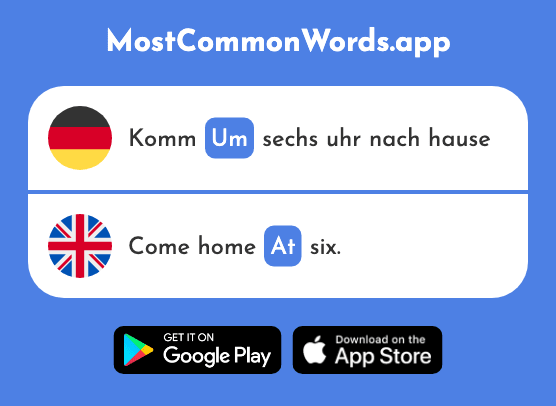Um - Around, at, in order to (Das 44 Häufigste Wort In English)
Das Englisch Wort für Um ist Around, at, in order to. Dieses Wort taucht oft auf, wenn es um sein & wandel, standort & ort, zahlen & menge geht. Es kann als präposition, verbindung verwendet werden. Es ist das 44 Wort auf Englisch und wird als A1-Wort eingestuft. Unten sehen Sie Beispielsätze für den Kontext, und Sie können sich auch ihre Aussprache anhören, indem Sie auf das Lautsprechersymbol klicken. Laden Sie unsere App herunter, um offline auf dieses und die anderen 3000 gebräuchlichsten Englisch Wörter mit über 60000 Beispielsätzen, Aussprachen und verschiedenen Übungsarten zuzugreifen.
Pronunciation
Examples
Komm um sechs Uhr nach Hause
Come home at six.
Sie wird zurück sein um 17 Uhr.
She will be back at five.
Komm um sechs her, nicht früher.
Come here at six, not before.
Ich glaube nicht, dass ich genug Zeit haben werde, um alles zu tun, was ich tun möchte.
I don't think that I'll have enough time to do everything I want to do.
Ich gehe um drei beziehungsweise um Viertel nach drei.
I'll go at three, or rather at a quarter past three.
Ich lebe nicht, um zu essen; Ich esse, um zu leben.
I don't live to eat; I eat to live.
Normalerweise geht er um fünf Uhr nach Hause.
He generally goes home at five o'clock.
Das muss ich jeden Tag tun, um am Leben zu bleiben.
I have to do that every day to keep living.
Ein Freund kommt morgen zu uns nach Hause um zu spielen.
A friend comes to play at our house tomorrow.
Lass uns uns um fünf Uhr treffen.
See you at five
Es ist seltsam, dass er nicht hier ist. Er kommt immer um diese Zeit.
It is strange that he is not here. He always comes at this time.
Ich lebe nicht um zu essen, sondern esse um zu leben.
I don't live to eat, but eat to live.
Ich werde dort garantiert um Punkt zwei Uhr sein.
I'll be there at two o'clock without fail.
Er ist genau um zehn nach Hause gekommen.
He came home exactly at ten.
Sie müssen etwas später wiederkommen: Der Mann, der sich um diese Angelegenheit kümmert, ist gerade ausgegangen.
You'll have to come back a little later: the man who deals with that issue has just gone out.
Um Geld zu machen, würde er alles tun.
He would do whatever it takes to make money.
Er isst um sieben zu Abend.
He has dinner at seven.
Um sieben bin ich wieder da.
I'll be back at seven o'clock.
Ich muss morgen um zwei Uhr dreißig unterrichten.
I have to give a class tomorrow at 2:30.
Ich bin um 14:30 zurück.
I'll return at 2:30.
Ich gehe gewöhnlich um zehn ins Bett.
I usually go to bed at ten.
Dieses Wort erscheint in den folgenden Kategorien
Ähnliche, missverständliche Wörter
 Deutsche:
um
Deutsche:
um
 Englisch:
around, at, in order to
Englisch:
around, at, in order to


























